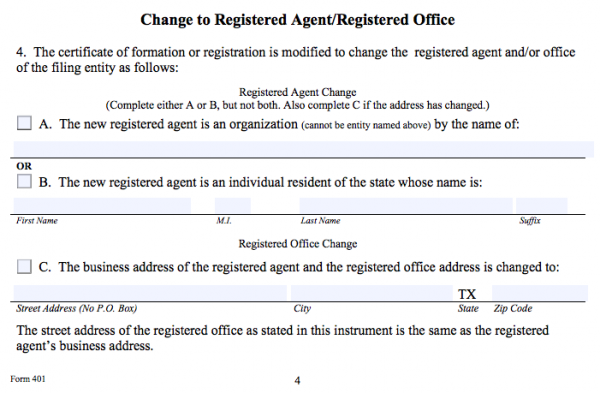What Is a Registered Agent, and Does Your Business Need One?
Find out which businesses need a registered agent, what the requirements are and how to change your selection.

Many, or all, of the products featured on this page are from our advertising partners who compensate us when you take certain actions on our website or click to take an action on their website. However, this does not influence our evaluations. Our opinions are our own. Here is a list of our partners and here's how we make money.
A registered agent is an individual or company that receives service of process, legal documents and official notices on your business’s behalf. When registering a business entity, you’ll be required to appoint a registered agent who has a physical address in the state of registration.
Not just anyone can fill this role, though. There are certain rules you need to follow when choosing one. Find out why you need a registered agent, who you can appoint and how to change agents.
Who needs a registered agent?
Any business that is registered with the state needs to appoint a registered agent, also called a statutory agent or resident agent in some states.
The following types of businesses need to appoint one:
- Corporations
- Limited liability companies
- Limited partnerships
- Limited liability partnerships
- Limited liability limited partnerships (not recognized in every state).
If you have one of these business types, you’ll be asked to name your registered agent during incorporation or business registration. There’s typically a spot to designate your registered agent on your articles of incorporation or articles of organization.
General partnerships and sole proprietorships don’t need to designate one because these business types are not registered with the state. Of course, all businesses need to keep up with business tax obligations and respond in a timely way to legal papers. However, the government doesn’t keep registered agent information on file for sole proprietorships and general partnerships.
Why do you need a registered agent?
States have required businesses to appoint registered agents for decades. The main purpose is to ensure that there’s a reliable way for the public, the courts and the government to contact your company. Once the state has your registered agent information, it’s a matter of public record. Anyone searching through a business entity database can find out who serves this role for your company.
More specifically, here are the three main reasons why registered agents are important:
- Receive legal process: People with legitimate legal complaints against a business have an address to send service of process.
- Government can contact you: The government knows how to contact a business that’s delinquent on taxes or noncompliant with other laws.
- Stay in compliance: Official papers notifying you of any action you need to take go to one address.
Most businesses hire a legal service or an attorney to serve as registered agent. Your registered agent will receive legal, tax and other official mail for you, forward the documents to your business address and notify you of any deadlines or actions that you need to take. For urgent documents, such as notice of a lawsuit, you’ll likely be notified the very same day.
Registered agent requirements
In general, registered agents must meet the following requirements:
- Age: If you use an individual, they must be at least 18 years old.
- Residency: If you use an individual, they must be a resident of the state of registration. If the registered agent is a company, it can be a domestic or foreign entity, as long as it’s authorized to do business in the state.
- Physical address: Must have a physical address in the state of registration. This location is usually called the “registered office.” P.O. boxes don’t count, so you can’t use a UPS Store, for example.
- Availability: Must be available to receive mail and sign official documents during normal business hours, Monday to Friday, 9 a.m. to 5 p.m.
Different states have slightly different regulations. For example, in Virginia, only licensed attorneys or officers or members of the business can serve as registered agents. And Arizona doesn’t mandate that registered agents need to be available during normal business hours. Your state’s business filing agency will be able to tell you more about state-specific requirements.
In some states, the registered agent must submit a consent form indicating that they’ve agreed to be your company’s registered agent.
Keep in mind that if you’re registered to do business in multiple states, each state will require you to name a registered agent who has a physical address in that state.
Who can serve as your appointed agent?
Every state gives you the choice to appoint yourself, someone else within the company or a third party, as long as the appointed agent meets the requirements mentioned above (plus any additional state-specific requirements). The only caveat — you can’t name your business as its own registered agent. There needs to a separate, responsible party, whether that’s an individual or an outside agency.
Any of the following can serve:
- Yourself
- A business partner, officer, manager or member of the business
- A business lawyer
- A company that provides this specific service, such as LegalZoom or Rocket Lawyer.
Often, the quickest, least expensive way is to just appoint yourself or another person in the company as the registered agent. But business owners often find that this is too time-consuming or inconvenient and end up appointing either a lawyer or a service.
Joe Horan, the owner of Wrightwood Homes, an Indianapolis-based property buyer, says:
“I originally chose myself because it was the easiest way to start my LLC. But I’ve recently chosen my attorney to be my registered agent. The main reason is that my attorney also has her own real estate business, so she understands the details of mine. She can handle all necessary paperwork and be the ‘legal face’ of my business. It’s fairly inexpensive for the service. I pay about $100 per year for my attorney to be the registered agent for my business.”
Rithvik Musuku, the president and CEO of Advancing Science Worldwide, went with an even less expensive option:
“In Arizona (where we are incorporated), a registered agent can be any person, and there is no requirement for them to be available during normal business hours. One of my family members living in Arizona is the registered agent for Advancing Science Worldwide. I would suggest that those looking to start a business look into the registered agent requirements for their specific states.”
Ultimately, the state doesn’t care so much about who you choose, as long as they’re doing what’s required of them, so make sure your choice is convenient for you.
Reasons to use a legal service
Dozens of legal service websites, including LegalZoom, Rocket Lawyer and Bizee, offer registered agent services for a fee. There are multiple benefits to using one of these services, as opposed to appointing yourself or someone else within the company.
These are the benefits of using a legal service:
Inexpensive
LegalZoom, Rocket Lawyer and Bizee charge about $150 per year for registered agent services. You can find even less expensive services, but the nice thing about sites like LegalZoom is that they also provide other kinds of legal assistance with business setup and maintenance.
As your registered agent, they will accept all legal and official correspondence on your company’s behalf, forward you the documents and give you timely notifications about pending deadlines or actions that you need to take.
Saves you time
Nearly one-third of small-business owners work more than 50 hours per week. If you’re spending time sorting through official mail, that adds to your already busy lifestyle.
By using a service, you’re free to go on vacation or take time off without worrying that you’re missing important mail. You also save time of going through junk mail. Since a registered agent’s address is a matter of public record, you will receive a lot of junk mail if you appoint yourself.
Privacy
Having a registered agent means that their address is public record, not your own. This protects your business to some extent from spammers. In addition, when you have an appointed agent, you can avoid potentially embarrassing moments in front of customers. Imagine being served with a lawsuit while you’re helping a customer. A service will send you important documents via email and postal mail.
Organization
If you have a fast-growing business, it can be tough to keep all your important paperwork and deadlines straight. Having a registered agent is one way to ensure that nothing gets lost in the shuffle. In addition to accepting official correspondence, LegalZoom and many other legal services will create a compliance calendar (like the one pictured above) for your business, noting important government deadlines.
Matt Ross, co-owner of RIZKNOWS and The Slumber Yard, which operate multiple internet properties, chose LegalZoom after using the website for LLC setup.
“We used LegalZoom to form our LLC, so we thought it was easiest to stick with them as our registered agent as well… Whenever they receive documents from the state, they immediately snail-mail us copies. Within the LegalZoom account portal, you can also just download PDF copies of the documents as well. In addition, there is also a calendar within the LegalZoom account portal that shows you when important deadlines are approaching.”

Changing your registered agent
No matter who you select, you’ll need to keep the information up to date. Having a registered agent is an ongoing requirement, meaning that you need one as long as your business is operating.
If you change your registered agent or their contact information changes, you’ll need to inform your state’s business filing agency. In most states, there is a change form (example from Texas shown above) that you can download and fill out online. Some states allow electronic filing, while others require that you mail in the form. The fee for changing your appointed agent is usually pretty low, $25 to $50 in most states.
It’s easy to forget about updating your registered agent, but make sure you fill out the necessary papers. The fines for a lapse can be pretty hefty. And if you go too long without an appointed agent, the state can revoke your certificate of good standing or even dissolve your company.
A version of this article was first published on Fundera, a subsidiary of NerdWallet
Article sources
NerdWallet writers are subject matter authorities who use primary,
trustworthy sources to inform their work, including peer-reviewed
studies, government websites, academic research and interviews with
industry experts. All content is fact-checked for accuracy, timeliness
and relevance. You can learn more about NerdWallet's high
standards for journalism by reading our
editorial guidelines.
More like this
Related articles







